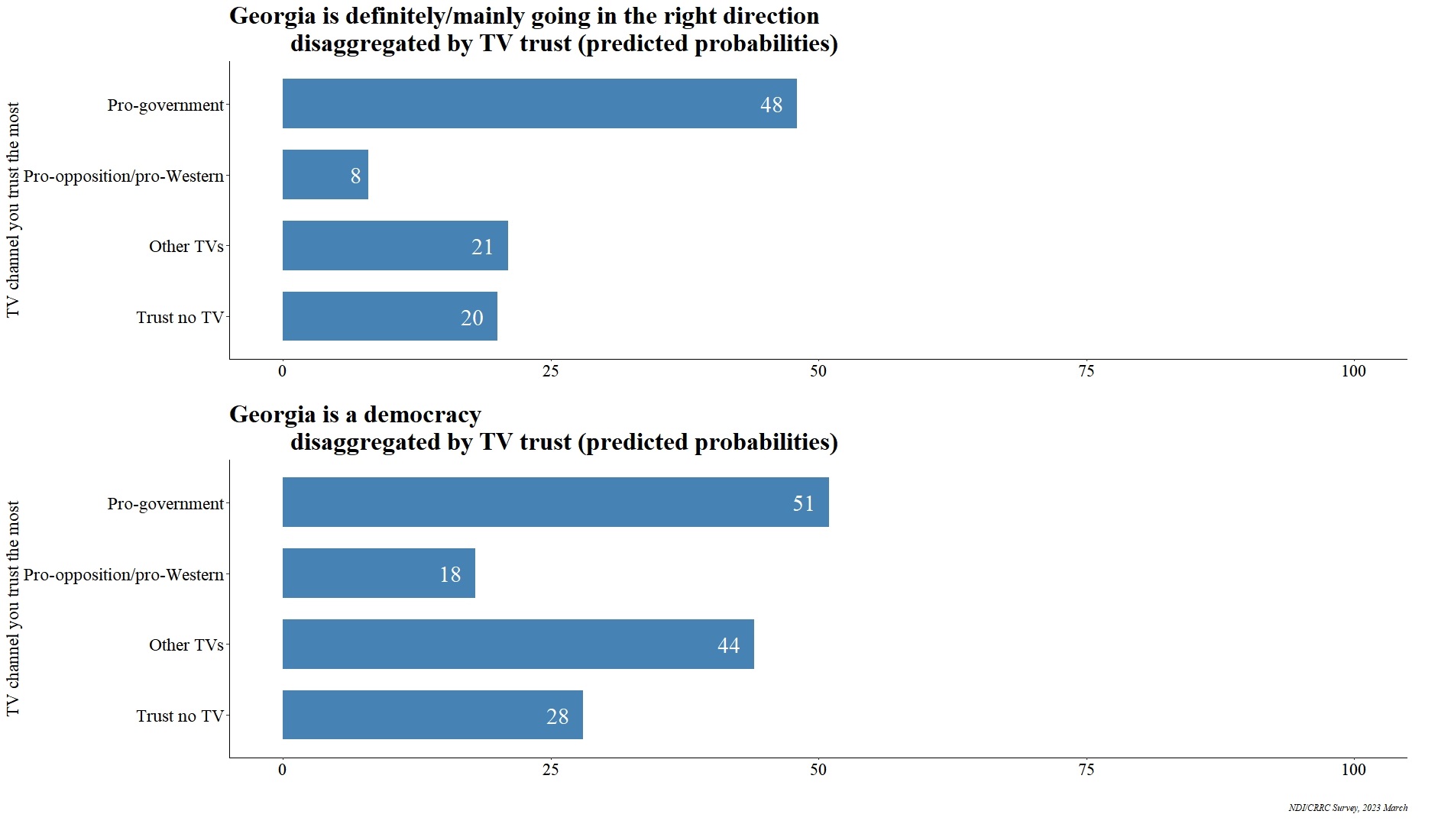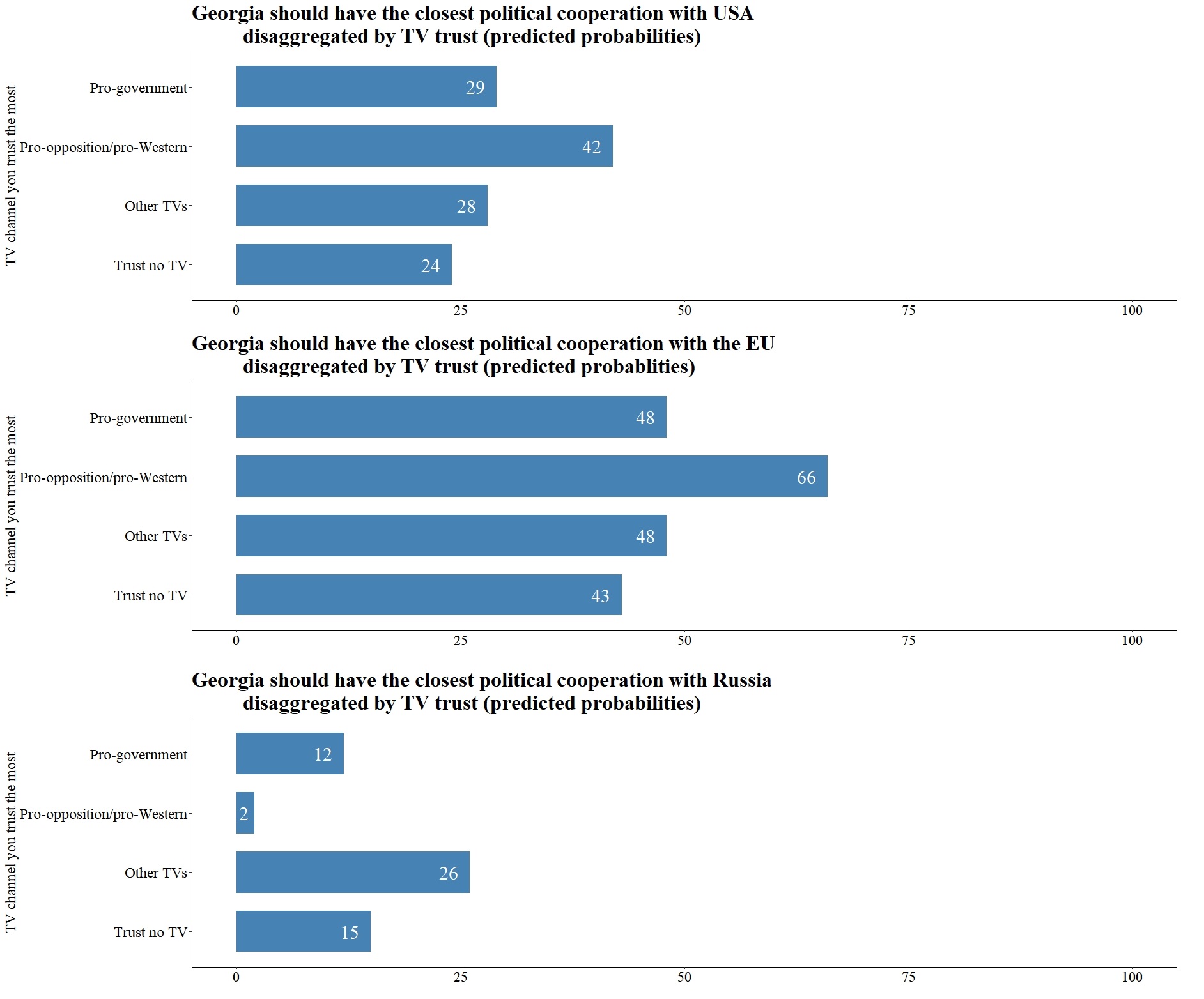A recent NDI/CRRC survey suggests that Georgians have markedly different beliefs about the present state and future of their country, regardless of their party sympathies, depending on whether the television channel they trust is pro-government or pro-opposition.
Georgian media is widely considered to be heavily polarised, with its focus ‘almost entirely on the party-political agenda’, according to one respondent in a recent DW Akademie study.
This polarisation may have reached the point of impeding the functionality of the media: a 2021 study found that Georgia’s main media outlets in Georgia had become so partisan that their ability to report in the broader public interest was undermined.
Research using data from a March 2023 NDI/CRRC survey found that people’s attitudes and perceptions of Georgia and its politics differed significantly depending on what TV channels they considered trustworthy, even when controlling for party preferences.
The data suggests that people who trust pro-government TV channels tend to be more optimistic about the country’s direction, less concerned with political issues, more convinced that Georgia is a democracy, and more open to Georgia cooperating with Russia on political as well as economic issues than people who trust pro-opposition TV stations.
In Georgia, one in five people (19%) trust pro-government TV channels the most (Imedi or PosTV). Roughly every eighth Georgian (13%) puts their trust in pro-opposition TV channels (Mtavari, TV Pirveli, Formula, Kavkasia), and a similar proportion (12%) of the public trusts other TV stations (Rustavi 2, GPB, Adjara TV, Obiektivi, etc.). The remaining 57% of the electorate trust no TV channel or are uncertain about which station they trust most.
The data suggests that regardless of age, sex, settlement type, ethnicity, wealth, and partisan sympathy, people who trust pro-government TV channels tend to feel more positive about Georgia’s present and future, compared to people who trust other TV channels or do not trust TV at all.
All else being equal, Georgians whose most trusted TV channel is pro-government are 40 percentage points more likely than people who trust pro-opposition TV channels to think that the country is going in the right direction, and 33 percentage points more likely to say that Georgia is a democracy today, than people who trust pro-opposition channels.

Regarding which countries or international organisations Georgia should have the closest political cooperation with, people who trust pro-opposition TV stations differ from other segments of the electorate.
A regression analysis suggests that people who trust pro-opposition TV channels tend to be more pro-Western and anti-Russian than people who trust pro-government media, other TV channels, or do not trust TV at all.
People who trust pro-opposition TV channels are 13 percentage points more likely to think that Georgia should politically cooperate most closely with the USA, and 18 percentage points more likely to think that the EU should be Georgia’s closest political ally, than Georgians who trust pro-government media.
Moreover, they are 10 percentage points less likely to say that Georgia should have its closest political ties to Russia.

The patterns are similar for opinions on Georgia’s economic partnerships. The data suggests that after controlling for age, sex, settlement type, ethnicity, wealth, and partisan sympathy, people who trust pro-government TV channels are twice as likely to support deepening economic relations with Russia than people who trust pro-opposition TV stations.

Similar patterns emerge regarding what issues people consider to be priorities in Georgia.
All else being equal, people who trust pro-opposition TV channels are more likely to name political issues (free and fair elections, court systems, freedom of speech, media independence) and less likely to name socio-economic issues (rising prices, wages, pensions, jobs, poverty) as the most important problems that Georgia faces today than people who trust other TV channels (pro-government and non-affiliated media).
Georgians that trust pro-opposition TV channels are 10 percentage points more likely than people who trust pro-government media and 13 percentage points more likely than people who trust other TV channels to name political issues as the most pressing problems that the country is facing.


Georgians who trust pro-government media tend to assess the government’s performance positively, both broadly, and more specifically in terms of Georgia’s efforts at integrating into the European Union, while people who trust other TV channels or trust no TV at all tend to be more critical.
After controlling for other factors, people who trust pro-government media are 40 percentage points more likely than people who trust pro-opposition media to report that the government is doing everything in its power to ensure Georgia’s EU membership. Similarly, they are 20 percentage points more likely to say the same in comparison to people who trust other media or no media at all.

All else being equal, people who trust pro-government TV channels have a 74% chance of assessing the current government’s performance positively, versus 27% for those who trust pro-opposition media. As with other issues, people who trust non-partisan TV channels and people who do not trust any TV channel at all are somewhere in between.

The above analysis is correlational rather than causal, so cannot identify causal effects of trusting or viewing partisan TV channels. However, it is evident that people who trust explicitly pro-government and pro-opposition TV channels view things differently. This association between trust in TV channels and public attitudes holds true even after controlling for partisan identification, suggesting that TV might play an important and independent role in shaping politically polarised segments of Georgian society.
Note: The above data analysis is based on logistic and multinomial regression models which included the following variables: age group (18-35, 35-55, 55+), sex (male or female), education (completed secondary/lower or incomplete higher education/higher), settlement type (capital, urban, rural), wealth (an additive index of ownership of 10 different items, a proxy variable), party identification (Georgian Dream, Opposition, Not affiliated) and ethnicity (ethnic Georgian or ethnic minority).
This article was written by Givi Silagadze, a Researcher at CRRC Georgia. The views expressed in this article are the author’s alone and do not represent the views of NDI, CRRC Georgia or any related entity.
The data used in this article is available here.















